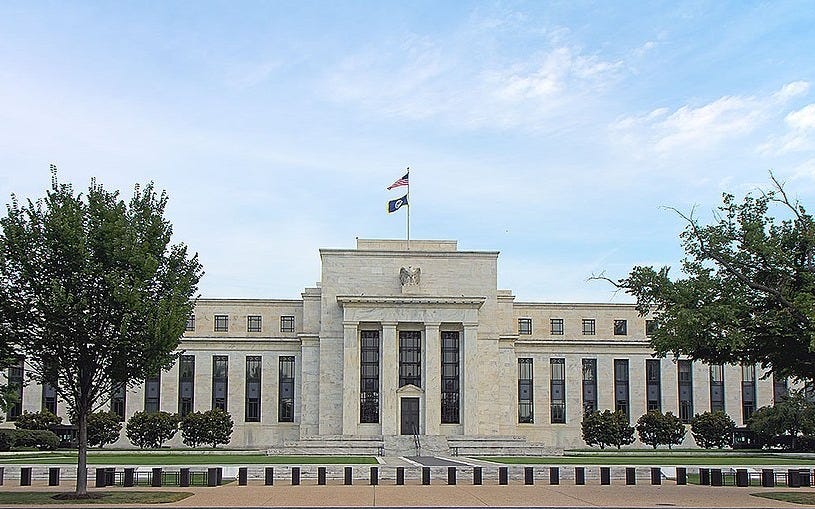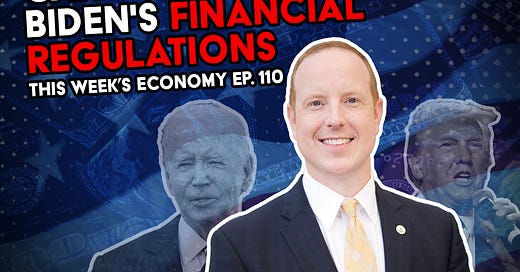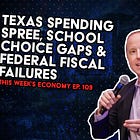Can Trump Clean Up Biden's Financial Regulations? | This Week's Economy Ep. 110
Unwinding financial regulatory overreach to revive economic opportunity.
Hello Friends!
The Trump administration has inherited a broken financial policy landscape. President Biden’s legacy of regulatory overreach and heavy-handed interventions stifled growth, distorted markets, and limited opportunity for individuals and businesses.
The good news? The Trump White House and a Republican-led Congress now have an opportunity to reverse course and restore financial freedom, creating a more dynamic and inclusive economy. Americans are counting on them to deliver.
In this edition of This Week’s Economy, I’m sharing my top financial policy reform priorities—from ending the Consumer Financial Protection Bureau to empowering fintech innovation. Catch the full episode on YouTube, Apple Podcast, or Spotify, and visit my website for more information.
HOW WE GOT HERE
The Background:
The Past: In response to recent economic disruptions, numerous financial and monetary policy actions have been taken.
The Dodd-Frank Act, although intended to stabilize the financial system after 2008, reinforced the notion of “too big to fail,” burdened small banks, and stifled competition.
The Federal Reserve’s pandemic-era balance sheet expansion created uncertainty and raised concerns about its growing economic role.
The Biden administration’s regulatory overreach slowed growth, distorted markets, and prioritized central planning over innovation and prosperity.
The Present: Today, the Trump administration and a Republican-led Congress have a crucial opportunity to reverse these damaging policies and unlock America’s full economic potential.
The Future: America’s financial system performs best when markets are free, incentives are aligned, and individuals are empowered to succeed. To restore long-term prosperity, Washington must embrace these principles and reject the interventionist agenda of the past. By rolling back burdensome regulations, implementing a rules-based monetary policy, encouraging fintech innovation, privatizing housing finance, and ending taxpayer-funded bailouts, policymakers can promote a dynamic, inclusive economy where individuals and businesses thrive.
Keep reading to examine key financial regulations in the news.
1. ROLL BACK BAD BIDEN-ERA RULES

The Principles:
The Biden administration pursued a pattern of fiscal irresponsibility, including costly handouts such as student loan forgiveness and expanded Social Security benefits for many government employees. These actions worsened the national debt, created moral hazards, and unfairly favored select groups at the expense of taxpayers. Meanwhile, the Consumer Financial Protection Bureau (CFPB) imposed heavy-handed regulations on banks and industries under the guise of consumer protection.
My Solutions:
Greatest Threat to the Financial System: One of the federal government’s top bank regulators left the vault wide open. The Office of the Comptroller of the Currency, part of the U.S. Department of the Treasury, suffered a massive data breach that lasted nearly two years, beginning under the Biden administration. This scandal highlights a stark double standard: regulators demand perfection in security from the private sector while failing to uphold basic standards themselves.
Harmful CFPB Rules: Many of the most damaging policies stemmed from the CFPB. From excluding medical debt from credit scores to the overdraft rule and Section 1033, the agency disguised expanded federal control as consumer protection. These rules undermined credit score reliability, risked consumer privacy, and limited access to credit for those who need it most.
Solutions: We must eliminate or revise harmful regulations, especially those from Dodd-Frank (should be repealed), and tailor rules based on an institution’s size and risk. Repealing restrictions, such as the Volcker Rule, can enhance liquidity and investment opportunities without compromising financial stability. Most importantly, it’s time to eliminate the CFPB and end its partisan targeting of disfavored industries and individuals.
Related Resources: Catch up on the news of the OCC breach in my latest for RealClear Markets.
2. ADOPT RULES-BASED MONETARY POLICY

The Principles:
Monetary policy reform is urgently needed. The Fed’s massive balance sheet expansion during the pandemic created market uncertainty and blurred its economic role. Even President Trump has recently warned that without lower interest rates, the U.S. economy could stall, further highlighting the need for action.
My Solutions:
The Bloated Balance Sheet: The Fed’s dual mandate is to maintain price stability and achieve maximum employment, but its most direct tools for achieving this are managing inflation by adjusting its balance sheet and the money supply. With a $6.7 trillion balance sheet fueling inflation, exacerbated by tariffs and unchecked federal deficit spending, the Fed must prioritize reducing its balance sheet.
Rules-Based Approach: Adopting a rules-based framework, such as capping the Fed’s balance sheet at 6% of GDP (as it was before the Global Financial Crisis), compared with the current 23% of GDP, would dramatically improve transparency and rebuild market confidence.
Act Now: The Fed, Congress, and the White House face a pivotal moment. The Fed must reduce its balance sheet, Congress must rein in deficit spending and limit the Fed’s emergency powers, and a full audit should be conducted to ensure accountability. The White House can play a vital role by urging fiscal discipline. Together, these reforms would curb malinvestment and pave the way for more profound structural changes, ultimately leading to the end of the Fed.
Related Resources: I discuss President Trump’s recent comments on the Fed and Jerome Powell in last week’s episode of This Week’s Economy.
3. FOSTER FINTECH INNOVATION
The Principle:
Fintech has the potential to expand access to financial services, lower costs, and drive innovation. But regulatory uncertainty—particularly around blockchain and digital assets—is holding it back. One major concern is the CFPB’s Section 1033 rule, which requires financial institutions to share consumer data with third parties, including fintech firms, when authorized by the consumer.
My Solutions:
The Competitive Impact: Section 1033 poses a threat to consumer financial security and imposes substantial compliance burdens, particularly on smaller financial institutions. Larger banks and fintech firms can absorb these costs more easily, creating an uneven playing field that reduces competition and ultimately harms the very consumers the rule claims to protect.
A Smarter Approach to Data Sharing: Consumers should have the right to share their data, but access to bank infrastructure should be voluntary and market-driven. Fintech firms should negotiate and pay for access like any other business in a free economy. That’s how real innovation happens, investment is rewarded, and consumers are protected.
Fostering Future Innovation: Congress should adopt a light-touch regulatory approach, focusing on fraud prevention rather than obstructing innovation. Removing barriers to peer-to-peer lending, digital payments, and crowdfunding will empower consumers, increase competition, and unlock new economic opportunities.
Related: Read my latest piece on Section 1033 and how it's central planning disguised as consumer protection.
4. PRIVATIZE HOUSING FINANCE

The Principle:
More than a decade after the 2008 financial crisis, Fannie Mae and Freddie Mac remain under government conservatorship, sustaining a system of implicit taxpayer guarantees that encourage risky lending. Meanwhile, lawmakers across the country are pushing misguided efforts to penalize institutional investors, falsely blaming them for rising housing costs and declining homeownership, despite evidence to the contrary.
My Solutions:
Privatize and Restore Market Discipline: Privatizing Fannie Mae and Freddie Mac is essential to reduce taxpayer risk and restore accountability in the housing market. It would encourage sound lending practices and allow market forces—not government guarantees—to guide home financing.
Reevaluate Federal Housing Programs: Federal programs that promote over-leveraged homeownership should be reconsidered. A stable housing market should be driven by supply and demand, not unsustainable government intervention.
Stop Scapegoating Investors: Professional Investors Aren't the Problem. They’ve helped expand and maintain the supply of quality rental housing. Demonizing them distracts from the real issues: excessive regulation, outdated zoning laws, and high property taxes. If lawmakers truly want to lower housing costs, they should start by addressing these issues.
Related Resources: I recently discussed the push to tax institutional landlords and why it misses the mark entirely.
5. ALLOW COMPETITION TO THRIVE

The Principle:
Government bailouts and market interference must end. Propping up failing institutions creates a moral hazard, encouraging excessive risk-taking without accountability. Now, lawmakers are also targeting interchange fees, pushing bills to ban banks and credit unions from collecting fees on the tax and tip portions of credit and debit transactions, further distorting the market.
My Solutions:
Let Markets Work: Price controls have a proven track record of failure. They distort incentives, limit supply, and ultimately harm the consumers they claim to help. Real competition requires government to step aside—giving consumers access to the products and services that meet their needs and letting businesses innovate freely. Consumers don’t need protection from choice—they need access, transparency, and freedom.
Protect the Payment Ecosystem: Interchange fees are essential to a secure and functional payment system. They help fund fraud prevention, sustain payment infrastructure, and enable rewards programs. State attempts to carve out fee exemptions, and federal proposals like a 10% cap on credit card interest rates, may sound helpful, but would undermine credit access and payment system integrity. This is market sabotage disguised as consumer protection.
End “Too Big to Fail”: With the national debt exceeding $36 trillion, taxpayer-funded bailouts must stop. Congress should implement clear, market-based bankruptcy procedures to ensure no institution is “too big to fail.” This would protect taxpayers, strengthen accountability, and support long-term financial stability.
Related Resource: Read my recent analysis of proposed interchange fee legislation in states such as Texas, Louisiana, Alaska, and Florida.
You can read my piece from earlier this year summarizing these financial policy concerns and solutions here:
My friends at Competitive Enterprise Institute shared excellent, actionable strategies for achieving these goals in their report, Free to Prosper: A Pro-Growth Agenda for the 119th Congress. I hope you’ll check it out!
Thanks for joining me in this episode of "This Week's Economy." For more insights, visit vanceginn.com and get even greater value with a paid subscription to my Substack newsletter at vanceginn.substack.com.
God bless you, and let people prosper!
Keep reading with a 7-day free trial
Subscribe to Let People Prosper to keep reading this post and get 7 days of free access to the full post archives.












